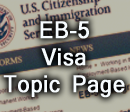USCIS has nearly simultaneously announced, with great fanfare, the creation of a new office to handle immigrant investor (EB-5) applications and (a little more obscurely) has predicted a sharp decline in one of the three basic applications used in that program.
My general reaction is that it is tacky for the government to sell visas to otherwise inadmissable aliens in exchange for a half-million-dollar investment in some private sector deal, an investment that can be withdrawn after a couple of years. A detailed discussion of the EB-5 program, including its frequent encounters with fraud, can be seen in the CIS Backgrounder "The Immigrant Investor (EB-5) Visa: A Program that Is, and Deserves to Be, Failing".
By the way, it is not just one visa per investment; it is a whole family's collection of visas for each investment. The program has the initials EB-5 because it is the fifth and last (and the least) of the employment-based green card admission categories.
USCIS Director Alejandro Mayorkas has been troubled for years with his staff's often (totally appropriate) unenthusiastic reaction to applications for this program and has taken many steps to encourage higher approval percentages.
One of the most awkward parts of the program, from the view of Mayorkas, has been his agency's handling of petitions filed in the United States by would-be EB-5 regional centers, the private, for-profit middlemen who want to get their hands on the aliens' money. A lot of these proposals have been rejected and in many other cases the staff has asked a batch of questions about the people and the investments involved. In the latest move, the agency has created a new EB-5 office and is looking for a (presumably cooperative) person to lead it.
In the letter describing these moves, Mayorkas adds:
[A] special Review Board consisting of two Supervisory Immigration Services Officers and one economist will review every pending application for regional center designation for which a denial has been recommended, with applicants receiving the opportunity to discuss their cases in-person before any final adverse decision is rendered.
Incidentally, if you are a citizen, and your alien parent or spouse is faced with a cancer diagnosis in a place where cancer treatment is shaky (such as Somalia or Bhutan) and if your application for a visa for that person has been denied by USCIS, can you automatically get a one-on-one meeting with a USCIS decision-maker?
Of course not! That would be totally against long-standing USCIS policies, which call for other, more formal methods of appeal.
Only if you are a small-to-middle-sized developer seeking permission to open an EB-5 regional center do you get that privilege. The big fish in the financial community, JPMorgan, et al., don't need such arrangements because they would not touch the EB-5 program with a 10-foot pole; raising money half a million at a time is not their notion of a good idea.
Meanwhile, and totally on the public record (if not in a press release), USCIS has predicted an 81 percent decline in the number of applications it anticipates receiving for one phase of its program — receipt of Form I-829 when immigrant investors want to convert their conditional resident situation to that of full green card status. Such applications can only be filed two years after the initial investment, and are successful only if USCIS is convinced that the alien family involved has not had any serious brushes with the law, the investment is a legitimate one, and it is still in place.
The I-829 has been, unusually for USCIS, a form with very high denial rates, reflecting either errors or fraud (or both) on the part of the aliens filing. In the fiscal years 2005 through 2010 the denial rates for this form varied from 17 percent to 50 percent, usually in the 30-40 percent bracket. These are astounding numbers in the USCIS context as the agency routinely says "yes" to 90-95 percent of the applications in front of it. In the last 1.5 fiscal years, approvals have been higher for this form, near the agency-wide norm, apparently in response to administration pressure on the staff to approve these applications and/or a deliberate effort to place applications in limbo rather than to deny them.
But an item in the Federal Register placed on June 7 by USCIS suggests that the demand for investment-related green cards, via the I-829, is about to nosedive. The USCIS reported that it had received 2,345 of these applications in FY 2011.
the EB-5 Visa Program:
However, its Federal Register filing regarding a badly needed redesign of the all-too-sketchy Form I-829, says that it expects 441 applications a year, a reduction of 81 percent. This sharp reduction is apparently expected despite the massive efforts of the agency's leadership program to sell the program to aliens with half a million dollars, and to whip its own staff into approving these applications.
There are several possible explanations for these statistics; the easiest is that one part of USCIS, the part working on regulations, hasn't gotten the memo saying that this program is a high administration priority; another possibility is that this is just another example of how badly USCIS handles numbers generally.
The third possibility is that the Federal Register prediction is right on target and there is sound statistical evidence for that.
After all, the number of I-829 applications received in the first half of FY 2012, according to the statistics cited above, was only 375; doubling that number (to cover the whole year) would produce 750. The number 441 is in the middle of the 375-750 range. The number 441 is much closer to either 375 or 750 than it is to the 2,345 reported in FY 2011.
Maybe alien investors don't keep all their promises to actually invest; maybe they have become discouraged with this program; maybe, and this may be hard for some to swallow, after two years of exposure to the U.S. economy they decided ultimately that they really do not want to live in the United States, so they do not file the I-829.
In any case, those of us who are not enraptured by the EB-5 program will be watching the number of I-829 applications carefully.
Note:
USCIS is to be commended for its use of the term "Immigrant Investor" program in Director Mayorkas' letter mentioned above; in both the earlier Federal Register notice and on the I-829 form, the term is "entrepreneur". The latter is totally misleading as these investments are routinely passive ones, often in construction projects, and only very rarely involve an alien running his or her own company.


